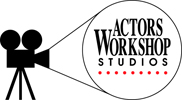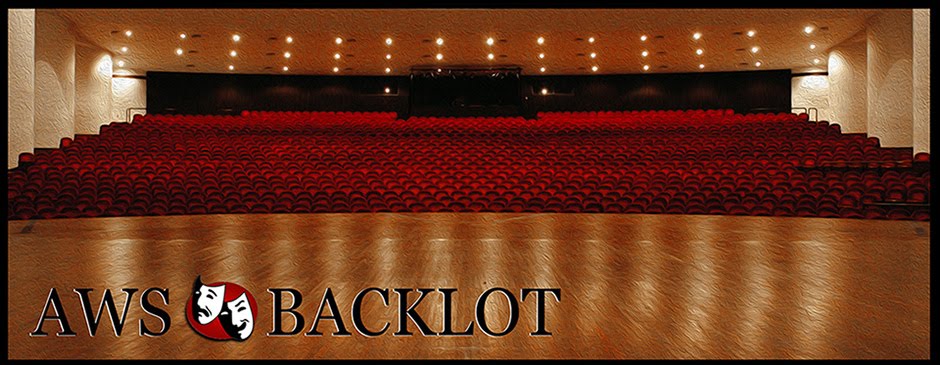
6/27/2018: AWS Advanced Class Recap: On Character Choices
Greetings!
Wonderful class last night. Lots of new faces, as well as a few returning favorites. Had to say goodbye to 2 of you last night – Bryce and Nico. I hope your travels are safe and productive, and that you return to us when you can! I look forward to continuing to work with you both.
We covered a lot of ground last night in class. We rolled through the Coach’s Notes, and talked a bit with those in class who are currently working on projects. I discussed the screening event I went to, for the 48 Hour Film I created this year (with my team), called Riptide. I said I would embed the film in this blog post, for those that wanted to watch it, so here it is.
Embed isn’t working, so FOLLOW THIS LINK to see it.
My experience making the film, as a whole, was wonderful, and I look forward to participating again next year – perhaps with some of you on the cast!
Character Creation
We then began our discussion on Character Creation. There are times when it makes sense to be yourself in a part, and there are times when it makes sense to craft a character for you to inhabit. Learning to recognize when one route is preferable to the other is a skill you should all give thought to honing and developing. If YOU will work for a role, then why reinvent the wheel? In fact, if YOU are perfect for the part, trying to layer unnecessary additional choices over the top of YOU could be counter-productive.
In other cases, crafting a character to inhabit is preferable – even necessary. If you land a part in a Coen Brothers movie, for example, you’ll be cranking parts of your own personality up to 11, and also adding entirely new physical and personality traits into the mix as well. The Coen’s like their characters to be quirky. In this case, techniques from Chekhov and Adler should be in your toolbox.
Here is a clip from No Country For Old Men (Coen Brothers 2007) that we watched, with the peerless Javier Bardem and character actor Gene Jones, showcasing their stellar character work.
“What’s the most you’ve ever lost on a coin toss?”
In a way, there’s no purpose to this coin toss scene, story-wise. It does nothing to move the plot forward. This scene is pure character development – which is an exercise in futility, if you don’t have actors bringing characters to the table that are worth developing. But a great script in the hands of great actors? Get the Oscar Noms ready… This film received 8 nominations, and won four Oscars, for Best Picture, Director, Screenplay and Best Actor for Bardem.
I showed a second clip, from the TV show Gotham, season one, in which Cameron Monaghan reveals his true identity, accompanied by a brilliant supporting performance by character actor Mark Morgolis as the blind fortuneteller. Watch their choices throughout the scene, moment by moment.
This is one of my favorite examples of character-work, in either film or TV.
Support Group Exercise
I then had you each come up to the front of the class, and introduce yourselves, as though we were an Actor’s Anonymous Support Group. I had you tell us a story of your first acting experience – as YOURSELF (the way you normally speak), and then had you follow that up with a story about your favorite acting experience, but I asked you to add a character choice to your delivery – modify your voice (tone or accent), modify something about how you stood, or gestured, etc, or add a emotion or mood. It was fun to watch – not just to see your choices, but to learn a little bit more about each of you.
I hope you all saw the point of the exercise. I want you each to be comfortable being yourself in a role, as well as being a version of yourself. Some of you lost your “choice” part-way through, while others lost themselves in the the choice, and YOU disappeared completely. Hopefully, as we practice this, YOU will always be alive beneath your character(s), regardless of how many layers you need/choose to add.
We watched a quick clip of Daniel Day Lewis talking about character work (in a 2005 interview), and dealing with self-doubt on set. We watched the first 2 minutes only, but the whole clip is worth watching…
My concern during class was that, by this time, we had covered so much that DDL’s point got past many of you. I hope you take a moment and watch the clip again. What he’s saying is very valuable.
Pro Wrestling
Before launching into our scene-work for the evening, I touched briefly on the world of sports entertainment (aka Professional Wrestling). We discussed how there is no other form of entertainment like it. In the realm of Physical Acting, as well as the realm of Character Creation, in no other type of performance – live or taped – can one be given a role to play, night after night, city after city, where you daily develop, rehearse and perform that role, often for years at a time. A new script every night. Often, storylines can take months – or even years – to complete. Plus, you have to tell your stories physically, with very little chance to say anything.
Plus, the physical risks these guys and gals put themselves through in order to entertain the vast sea of fans worldwide is enough to make you question their sanity. I have huge respect for these performers.
I mentioned the Golden Lovers Storyline in New Japan Wrestling, which took a full decade to complete (see the linked video), and also the infamous Hell in a Cell match from the King of the Ring pay-per-view in 1998, which featured Mick Foley (wrestling as Mankind), and Mark Calloway (as The Undertaker). Please follow THIS LINK to watch the match in it’s entirety and THIS LINK to read about the real-life behind-the-scenes story behind why Foley decided to approach the match like he did, with his doubts and fears.
It’s worth pondering, if for no other reason than to show that these are fellow actors, making the same choices we all are making in our craft, only at much higher levels, and to far less respect. They’re real people like us, trying to entertain.
Scenework: Boardwalk Empire
We paired up and received scenes from the TV show Boardwalk Empire, along with a one-page sheet to help you break the scenes down and get the basics of your character work going. I had you work individually at first, and then together, as I floated around, talking to each pair about the choices you were making, and the details surrounding your work. We were able to walk through each scene together, and you all received your marching orders for next class. When we meet again, I’ll have my film gear, and we’ll film each scene, likely finding appropriate locations in and around the building to film each scene (as opposed to limiting the filming to the class space, as usual.)
I also passed out new monologues to those of you who wanted them. We should always have a monologue or two under development – they are great training tools. Once the text is memorized, there’s no end to the character choices you can layer in and out, experimenting, trying new emotions, actions, affectations, etc.
I turned everyone loose without mentioning one VERY IMPORTANT thing! Next Wednesday is Fourth of July! We all agreed to come to class to film, but I’m not sure everyone realized that the holiday will fall on class night. I have a feeling many of you will prefer to be out with friends and family that night, enjoying fireworks and food, rather than being in class. We will be contacting each of you individually this weekend, to see who still wants class – if enough of you want to postpone filming a week, we can certainly reconvene on the 11th.
All in all, I loved class, and have new ideas on things to do next.
Until we meet again!
David Wagner
AWS Staff
5/23/2018: Advanced Class Recap: Ninjas and Accents and Free Cake!

Greetings!
Interesting class on the 23rd, methinks!
After starting with a quick reading of the coach’s notes, we started class with a couple rounds of Ninja, which I first learned about in the Spolin classes I took back in the day, but discovered that many of you knew the game yourselves from other sources. Which is cool, of course. The focus of the Ninja Game is observation and spontaneity.
I tried to introduce the concept of Accent Night, saying that for the evening, everyone should interact in class attempting a New York accent – even if it’s a lousy one. Actually, especially if it’s a lousy one! We won’t get better at doing accents if we don’t try – they’re not only fun to do, but if you get good at one, it looks good on the ol’ resume. I’d love to make the classroom a fun, safe place to experiment with accents, limps, quirky physical things, etc. Unfortunately, the novelty wore off quickly. I’ll keep trying, though. Maybe next week, it’ll be Southern Accent Night!
We segued quickly into monologue work. After performing a quick piece from The Matrix (1999 dir. Wachowskis) myself as a demonstration, we paired off and practiced our monologues with each other, trying to be as casual and connected as possible. With everyone working at the same time, it (hopefully) killed the undercurrent of “performance” and encouraged you all toward naturally taking someone else’s words and presenting them as yourself, as though you are already the character.
In case you’d like to see the Agent Smith monologue, here it is [starting at the 1:50 mark]…
Now, am I saying that the way I performed the text in class is as good as Hugo Weaving’s performance here? Not in the least. The focus of the work, at this point, is to ingest another persons’ words and deliver them as yourself, which is what I tried to do. Weaving’s performance is based on a combination of his natural talents, choices made based on the script, and, I’m sure, a ton of detailed direction from the Wachowskis. I wasn’t trying to mimic his work (though I love doing so – he’s fun to impersonate!).
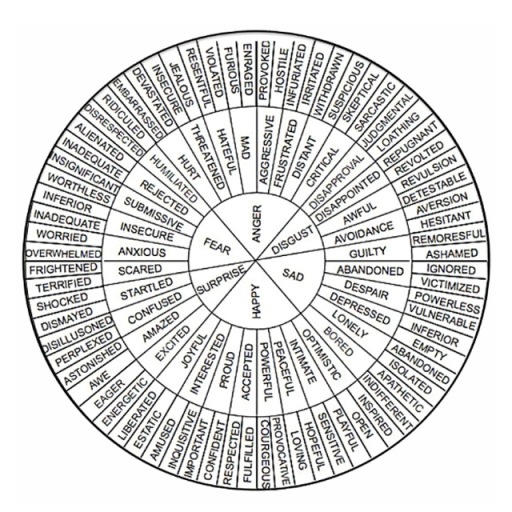
At some point during this work, I passed out card-stock copies of an Emotion Wheel, for your personal use.
This is a handy resource to have as you work with your monologues… and any monologues in the future. Monologues are wonderful craft tools – I think they’re maligned, in general. They may not be used in auditions much anymore, but really, once you memorize the text, there’s no end to the ways you can play with a monologue. Pick an emotion, layer it into the monologue and see how it changes. Then try another. Then try starting the piece with one emotion, and segue into another… and a third! Mix in an accent, or a limp. Put on a hat, and see how it affects the performance! Not everything will work, but man, is it fun to try! Don’t just lock yourself into one way of performing a monologue. Experiment, and grow.
As an example of a “one-note emotion” applied to a monologue, we watched Emma Stone’s monologue from Birdman (2014 dir. A. Innaritu), where she blasted her father with frustrated rage. [Warning, some language]
Wow. If you haven’t tried performing that all-out anger yet, it is very cathartic – provided you know the text inside-out (so you don’t get stuck in your head trying to recall the lines, thus killing the vibe), and can give yourself to the emotion. Birdman is a masterpiece – if you haven’t seen it yet, track it down and buckle up.
During our monologue work, we saw Kent crank his Theoden monologue from LOTR up to an “Emma Stone 11” and cut loose. It was a joy to watch!
We also watched a wonderful clip from In Bruges (2008, dir. M. McDonagh), where the magnificent Brendan Gleesen performed an amazing 6:30 one-take tour-de-force of a monologue (basically), in the motel room phonecall scene. What a stunning emotional journey he goes on – watch his incredibly-expressive face and body. And that’s all in one take. Unreal. Out of context, the scene is impressive. If you’ve seen the whole film, it’s doubly so.
Although we did watch this at the very end of class, I’m putting it here in the blog post, to keep the clips together. Continuity!
[Again, warning: language!].
Hopefully, the clip will begin as I intended, at the 36:48 mark – if it doesn’t, either skip ahead to that mark, or settle in and watch the whole film. It is one of my very favorites. Martin McDonagh is a fantastic Irish playwright, who has since expanded into film. In Bruges was his first feature film attempt (which he knocked out of the park), but he has since done others, including Seven Psychopaths and Three Billboards Outside Ebbing Missouri (which received 7 Academy Award nominations earlier this year).
We spent a good long time working on your monologues in class. As is to be expected, there’s a bit of a learning curve, as I get a sense for where each of you are at in your development, and experiment with little adjustments and things to try, so you can each improve in a way that best fits you. I’ll invariably try different things with each of you – that’s my call, please don’t interpret that as you not quite cutting it. We’re growing together, and you all have crazy-good talent. But we’re all different, keep that in mind.
I sent you home with instructions to start experimenting with your emotion wheels. Have fun with those monologues! And by all means, if you want to switch to another, feel free! The more the merrier. At one point, I believe my record was 21 monologues I could perform at the drop of a hat. I would cycle through them as I drove to and from work, etc. trying accents and emotions in various combination, for no reason other than I enjoy it.
By the time we were done with the monologue work, the time had gotten away from me. I didn’t have time to do the cold read audition work justice – I didn’t want to try to race through it. So I bumped it to our next class (5/30/2018) and instead, I handed out the scenes from Gilmore Girls.
But to whet your appetite for next week’s audition activity, I played a video of Kevin Spacey talking about the audition process, in a way that I believe whole-heartedly.
Setting aside your personal feelings for the accusations against him as a person, don’t let that harden you against what he says here. It’s a very useful approach to take to the audition process. In fact, the entire video is worth watching.
On the topic of Taking the Long View, Kent asked a great question about the possibility of this approach backfiring, and actually creating more anxiety. It certainly is a valid question, and sparked a little bit of conversation among the class, which I enjoyed. I fall back on my experience, from the perspective of being on both sides of auditions over the past few years. When I’m auditioning, I approach it exactly as Spacey relays. You’ll have to defer to your own comfort levels and give it your best.
The class ended with about 20 minutes of familiarizing yourselves with the Gilmore Girls scenes, and then a couple more rounds of Ninja.
—————————————-
SNEAK PEEK for 5/30 class
- Cold Read Audition and Discussion
- Stanislavksi, Bertolt Brecht and the formation of the Group Theater
- Gilmore Girls scene-work (which we’ll take out of the classroom to work on and film)
- Monologue work (if time permits) If you have any questions or suggestions, let me know!
See you on the 30th!
Dave Wagner
AWS Staff
5/16/2018: Advanced Class Recap: Watch their Faces!
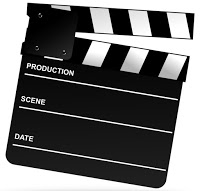 Solid class on the 16th. Great work by everyone! I hope all of you got a chance to watch the footage that we captured during the monologue and scene work.
Solid class on the 16th. Great work by everyone! I hope all of you got a chance to watch the footage that we captured during the monologue and scene work.
Here’s a recap of what we covered in class:
We started off with Coach’s Notes (Congrats to all who booked jobs!), and then we talked a bit about the perils of under-preparation, and strategies for how to navigate that minefield if you find yourself caught up short on stage. My solution was to break connection with the audience, retreat into my head for a bit, get my feet under me, and skim forward to the next part of the material that I knew well. Once I reestablished some momentum, I reconnected with the audience and was off and running again. There are other solutions — yours may vary — but having a plan is smart. Winging it is a bit unnerving…
We then played a few rounds of Find the Leader, which is a Violin Spolin game I discovered during my time training up north. The focus of that game is “observation”.
We then watched a couple videos, in preparation for the work on our monologues.
I started with the 2014 San Diego film “3:28am” by director Tom Antl, starring Joe Hurley and Gordon Brown, which was made for that year’s 48 Hour Film Festival.
FOLLOW THIS LINK to see the entire film.
We compared the acting approaches employed by the two leads.
We then shifted gears and watched a Game of Thrones clip (S2E2), again comparing the craft choices of Peter Dinklage and Dominic Carter.
We ended by watching part of a scene from the 2009 Tarantino film Inglourious Basterds, comparing the performances of Christoph Waltz and Brad Pitt.
I made mention of a couple of other videos I wished we’d had time to watch, including:
- The Interrogation Scene from The Dark Knight (dir Christopher Nolan 2008)
- The face-to-face meeting between Tyrion and Danaerys in Game of Thrones (S5E8)
- The final face-off between Daniel Day-Lewis and Paul Dano in PTA’s There Will Be Blood (2007)
We discussed occasions when the specific choice might be made to keep your face stony and expressionless, and whether that is ultimately counterproductive, compared to the impact that can be made when your face is alive with thought, activity, emotion.
I also mentioned the Processing Scene from PTA’s 2012 film The Master, starring Joaquin Phoenix and Philips Seymour Hoffman, who both gave magnificent, rich, alive performances, internally and externally.
In one of Tom Hanks’ visits to Inside the Actor’s Studio, he said that Spielberg gave him some excellent advice once: “Let them see you think.” This clip from The Master is a wonderful example of that approach in action – watch Joaquin’s face as he receives the questions, ponders them, processes them, and replies. What an amazing journey. Riveting. This is the type of work I’m hoping to nudge each of you towards.
Side Note: While there are some amazing scenes and wonderfully crafted shots in this film, be forewarned if you give the full film a watch. There are some awkward bits…
—————————————–
Next we hit the monologues. I think the idea to use your phones to film your scenes was a good one. I hope you all got a chance to review the footage. I knew it would be challenging for some of you to simply memorize the text and do no craft work, but that’s ok. I hope you see and understand what I’m trying to do with the work at this stage – trying to get you to be YOU, while saying someone else’s words. As we layer in work in the coming weeks and nudge the piece toward a final product, I still want the connections to YOU to be very evident. The evidence and results should be on your phones. I look forward to seeing the finished products compared to the initial attempts.
We talked briefly about OBJECTIVE in light of the simple game of TAG. I mentioned how odd it was, being in an acting class in LA with a dozen grown people, giggling and playing tag like a bunch of 5-year-olds. The objectives are so simple and primal, you don’t even need to think about it, just react. Touch, dodge, run, laugh… as we work on scenes, I hope we can each identify simple, primal objectives like this to include in our work, to help the scenes live. The goal is having the physical part of the work be as natural and fluid as the dialog delivery we’re working on now – as close to YOU as possible.
By this point in class, time was getting short, so I had to short-change my thoughts on Stanislavsky and the Group Theater, and shelve most of it for next week, as well as the introduction to Michael Chekov.
We got to our scene work, with the scenes from Noah Baumbach’s 2012 film Frances Ha, again with the stress on natural dialog, delivered as YOU. I enjoyed the work, but I think we forgot one of the scenes! Brianna, if you’re reading this, my apologies. When we do scene work next, you can go first.
We ended talking about two bits of homework I wanted you to consider, regarding observing yourself as you do daily, mundane physical actions, imagining that cameras were filming you. Also, when you feel certain emotions during the course of your day, take a moment and try to register where and how you feel the emotions. See if you can find the “on/off” switch inside you. Can you shut it off, and turn it back on again? Can you tone it down, or control the levels? Ultimately, we want to dabble with being able to introduce basic emotions into our work, to see how it affects the undercurrent of the scenes, etc.
Don’t get carried away with it at this point. Just try it a bit, and let it go. We’ll talk more in our next class.
—————————————-
SNEAK PEEK of Next Class
- Cold Read night!
- New Scenes and partners (possibly from Gilmore Girls or Sherlock, I haven’t decided yet…)
- Introduction to Stanislavski and the Group Theater.
- Monologue Work.
- And more!
I hope your weekend is a great one! Watch some good film/TV or read a book. Always be learning, eh!
David Wagner
AWS Coach
5/9/2018 Advanced Class Recap: Getting the Ball Rolling
 And we’re off and running! How quaint – a little bit of horse clipart, to set the tone!
And we’re off and running! How quaint – a little bit of horse clipart, to set the tone!
So we had our first Advanced Acting Class together, and I had a wonderful time, as I hope you did as well.
After making my way through my backstory, we talked about my decision to, in short, teach the type of class I’d always wished I could have found somewhere. I’d tried Method, Meisner and Spolin at length, and dabbled in a couple of others at various workshops and events, but many others were a complete mystery to me, and I’d often wondered what they all were, and how they differed, and what each approach brought to the table, as far as craft. In preparing to teach this class with you all, I discovered that they were all fascinating to me — especially Konstantin Stanislavski himself, and the impact he had on the landscape of Western Theater.
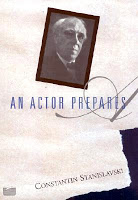 I decided we’d learn about them all: Stanislavsky, Chekov, Adler, Meisner, Strassberg, Hagen, Spolin, Mamet and Chubbuck, to name the major ones. We’ll discuss them all and dabble with the exercises that each of the methods endorse, in an effort to discover which work best for each of you, whether stage or screen.
I decided we’d learn about them all: Stanislavsky, Chekov, Adler, Meisner, Strassberg, Hagen, Spolin, Mamet and Chubbuck, to name the major ones. We’ll discuss them all and dabble with the exercises that each of the methods endorse, in an effort to discover which work best for each of you, whether stage or screen.
They all try to address the same issue: How to give an effective performance. And at the heart of each approach seems to be the issue of “What to do with YOU.” As in you, the person you are in your day-to-day life. How much of YOU should you bring into your character work? Strassberg says ALL OF IT, while Adler says NONE OF IT. Others advocate places in between.
I happen to believe that YOU are a character you’ve been working on for your entire life, and that you’d be foolish to set yourself aside and start every character from scratch — especially at this comparatively-early stage in your careers. I say that, for now, you should start every character as YOU, and tweak and modify it until it fits what the script and the director require. This will ensure that the foundation of your character is ALIVE and ACTIVE, and that you aren’t trying to layer a character over an empty core.
Stanislavsky advocated a balance between the INNER work an actor must do, and the OUTER work. Swinging too far into either direction will cause problems, which will undermine (or even thwart altogether) your performance.
———————
We passed out random monologues from my exhaustive monologue collection, with instructions to learn them without any “work” done to them, so you can come in and perform them as yourself. Again, this is not to say that each of your monologues will work best as yourself – it’s merely the foundational step, to ensure that as we layer work on top of the piece, it is added to a living foundation.
I then had you each sit in a chair, and I recorded you chatting about something that happened to you recently, with instructions to ignore everyone else in the room, and ignore the camera and just talk. The purpose was to let you see yourself as close to YOU as possible, with all of the wonderful little nuances and expressions that your face makes when you’re relaxed and not “performing”.
Unfortunately, the final footage was too blurry and low-res to be of any real use, so I had to scrap my plan to get the footage to you. I have another approach planned, which I will discuss with you all next class.
We then watched this Nerdwriter video essay on Sir Anthony Hopkins’ work in Westworld…
There’s so much good craft stuff online, I can’t wait to share it with you all, either in class or here on the blog.
We then received scenes from the 2012 independent film Frances Ha (dir. Noah Baumbach) and had a little time to work on them with our partners, with the focus being relaxed discussion, slipping the lines in as we chat. The goal being pleasant, relaxed conversation, with someone else’s lines delivered as YOU.
My “Rules”:
1. Relax
2. Have Fun
3. Be Yourself
4. Do the Work
The class ended with a reading of the Coach’s Notes, and a rather tense discussion on the concept of actors working for free. I may have to clarify a few things on this topic again in the near future, since I believe my opinions on the issue were colored by my own experiences, and therefore might have caused unnecessary confusion.
—————————–
Our Next Class on 5/16 – SNEAK PEEK
- Talk in more detail about what to do if you’re onstage and you stumble.
- Group Game: Find the Leader (Viola Spolin)
- Video Study: Several clips contrasting actor’s styles within the same clips (Game of Thrones, Inglourious Basterds, etc)
- Monologues “as you”, which we will tape, and add a choice for next week.
- Brief Discussion on Objectives.
- Intro to Konstantin Stanislavsky and the formation of the Group Theater.
- Chekov “Presence” Exercises (if time permits)
- Scene work on Frances Ha
Depending on how the Frances Ha scenes go, we may keep them and build upon them (as with the monologues), or I’ll give you new scenes and partners.
Hope to see you all there!
David Wagner
AWS Staff
Here’s another Nerdwriter video essay on delivering dialog…
Welcome to the Blog!
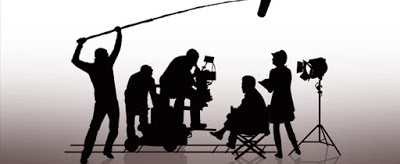
Here we go…
Welcome to the first of many posts for the AWS Advanced Class 2018! This is where I will be recapping what we learn in class, elaborating a bit (or a lot!) and giving you the chance to dive a little deeper, if you wish. I have WAY too much fun stuff to share with you during class itself, so this will be where I offer it up to you…
It is also where I will relay announcements, upcoming events and auditions, and give you a sneak peek into what I’m putting together for upcoming classes. If I can make files available for download, this will be a good place to get them to you as well, as far as full/partial scripts, monologue collections, notes and handouts and other such nonsense.
Plus, y’all can bring question(s) to class, where we can discuss them in person.
I will add a new post very soon which will recap our first class, the topics we covered, and other odds and ends.
To get your creative juices flowing, here’s the opening 2 minutes of the 2006 film The Fall (dir. Tarsem). Make sure your speakers are on – the music is as fantastic as the visuals are…
On behalf of everyone at Actor’s Workshop Studios, here’s hoping the year ahead will be awesome!
David Wagner
AWS Staff Member
